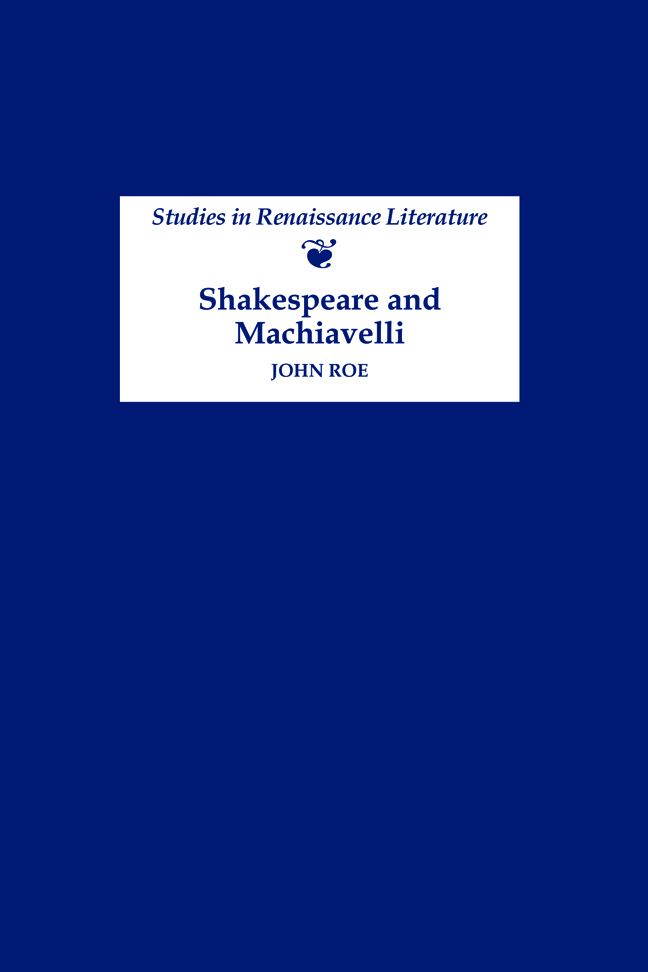Book contents
- Frontmatter
- Contents
- Acknowledgments
- Text and Abbreviations
- Preface
- Dedication
- 1 Shakespeare and Machiavelli
- 2 Richard II and the Bullingbrook Affair: Subtle Rhetoric and a ‘Silent King'
- 3 Henry V: The Prince and Cruelty
- 4 King John: Cruelty and the Action of Conscience
- 5 Julius Caesar: Conscience and Conspiracy
- 6 Antony and Cleopatra: Magnanimity and a Machiavellian Erotics
- Bibliography
- Index
Preface
Published online by Cambridge University Press: 15 February 2024
- Frontmatter
- Contents
- Acknowledgments
- Text and Abbreviations
- Preface
- Dedication
- 1 Shakespeare and Machiavelli
- 2 Richard II and the Bullingbrook Affair: Subtle Rhetoric and a ‘Silent King'
- 3 Henry V: The Prince and Cruelty
- 4 King John: Cruelty and the Action of Conscience
- 5 Julius Caesar: Conscience and Conspiracy
- 6 Antony and Cleopatra: Magnanimity and a Machiavellian Erotics
- Bibliography
- Index
Summary
Did Machiavelli influence Shakespeare directly, or did the Machiavellism that occurs in the plays derive from other sources? This is an old question which can never be decided with certainty; nor do I intend to try and provide an answer in this book. Though I examine the matter of influence as far as I am able, my purpose rather is to explore the various ways in which Shakespeare and Machiavelli may be brought together for comparison: that is, putting one author in the context of the other. A limited, melodramatic kind of ‘Machiavillainy’ may be traced here and there in Shakespeare, but it is far more interesting, and challenging, to contemplate his engagement with ideas that are the essence of Machiavelli's thought, wherever he found them. Because some of these ideas test the very foundations underlying the moral convictions of the age, they inevitably became confused with their sham, or shadow, version, identified as a devotion to evil, and portrayed on the stage in the figure of the ‘Machiavel'. In this study I try to maintain the distinction between ‘Machiavel’ and ‘Machiavellian’ to denote the difference between the popular, often deliberate, misconception and the more reflective response to Machiavelli's thinking.
Machiavelli, it has often been observed, voiced with unprecedented confidence a view that others had suspected might be true but which they were fearful of either announcing or confronting fully. This view is that the world in its operations is amoral, that none of the laws held to be essential for the governing of ethical behaviour exists in fact, and that the sole effective determinant in human affairs is the ability to exercise power. The mention of ‘others', incidentally, gives rise to an immediate objection. Why speak particularly of Machiavelli's influence, when his examples, as any annotated edition reveals, derive from classical authors such as Aristotle, Tacitus, Cicero, Plutarch, or Livy, all of whom he studied carefully? Such authors, now fully incorporated into the humanist tradition to which Shakespeare belonged, were available without the need for Machiavelli's intervention. One answer to this has just been given: Machiavelli drew from his authorities lessons which they themselves were reluctant to drive home. Another is that no ancient author remains in his original place, unaffected by the attentions of the humanist movement to which I refer.
- Type
- Chapter
- Information
- Shakespeare and Machiavelli , pp. ix - xiiiPublisher: Boydell & BrewerPrint publication year: 2002

